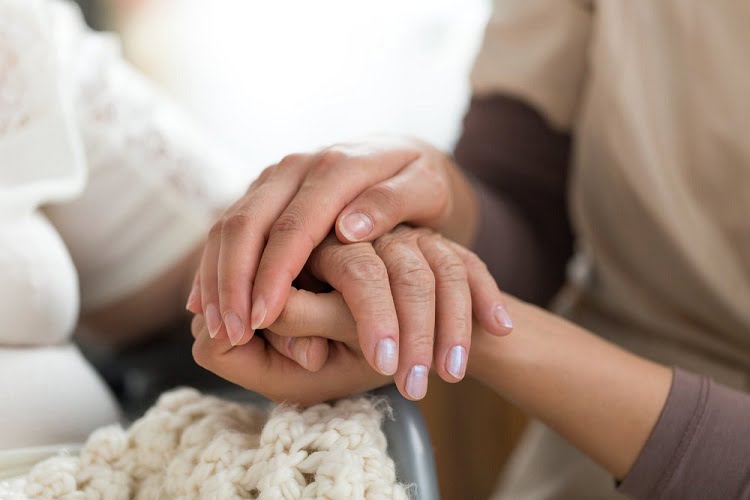While most people relate doulas to childbirth, many hire end-of-life doulas to ease the transition for their sick family members. Since end-of-life doulas are becoming more popular, many people have questions about what they do. Here are answers to the eight most common FAQs about death doulas:
I thought that doulas helped with childbirth?
Doulas are most commonly associated with pediatric scrubs and childbirth. They generally provide emotional, mental and physical support for expecting mothers throughout the labor process. In fact, the movement began in the 70s as the Lamaze method took off. Baby Boomers began looking for alternative ways to give birth outside of a traditional hospital environment. Now that many of those Baby Boomers are nearing the end of their lives, they are using doulas again. While doulas can and do specialize in childbirth, many of them are focusing on the end-of-life process instead.

What does a death doula do?
Doulas provide continuity. They help patients and their families before, during and after a death occurs. Doulas may offer different services depending on the clients and their needs. They provide companionship, help clients with non-medical tasks, talk with the family about what to expect, help with funeral planning and assist clients with legacy projects (i.e. sentimental items such as quilts, jewelry, scrapbooks and letters that the deceased leaves behind).
Do end-of-life doulas have medical experience?
Doulas are not required to have healthcare training, and people of different professional backgrounds become end-of-life doulas. That being said, many people from the healthcare field become doulas. In particular, nurses who used to spend hours in scrubs often become doulas. Healthcare workers who love to care for patients are often drawn to doula work because it allows them to provide holistic care focused on the whole patient, not only their immediate medical needs.
Where do end-of-life doulas work?
Most death doulas work with patients in their homes. However, they may also visit patients in assisted living facilities, independent living facilities or even hospice care. A doula will work with you to determine the best services and environments for your loved one.

Are death doulas different from hospice?
Death doulas and hospice workers care for patients approaching the end of their lives, but the focus is different. Hospice care focuses on meeting the physical needs of the patient and providing medical treatment. For instance, hospice work helps with pain management and basic life activities like eating and bathing. Death doulas may help with physical tasks to provide comfort, but they also focus on patients’ emotional and mental components. They help out with tasks beyond the scope of most hospice work, such as helping clients decide how they want to spend their last day. If your loved one is in hospice, you can still hire a death doula to ease this troublesome time.
When can you begin working with a death doula?
End-of-life doulas have a much more flexible timeline than other types of terminal medical care. For example, patients usually have to qualify before being admitted to hospice, but they may hire a doula before that point. Since most insurances do not cover doulas, clients generally have to pay for them out of pocket (more on how much death doulas cost below). If you or your loved one has a terminal condition that will cause deterioration over time, you might want to find an end-of-life doula sooner rather than later.
Are death doulas certified?
Since death doulas are relatively new, the industry is still unregulated. End-of-life doulas do not need any kind of certification to begin work. However, several organizations offer optional credentials, such as the International End of Life Doula Association (INELDA) and the Larner College of Medicine at the University of Vermont. Look for a death doula that has accreditations from a well-known organization. You should also ask for referrals in your area and interview any potential end-of-life doulas before hiring them. You want to make sure that they are qualified and a good fit for your family.

How much do doulas cost?
Because doulas are unregulated and operate outside of health insurance, they can pretty much set their own rates. Some doulas might charge by the hour, while others might offer packages for different services. Some offer a sliding scale that depends on the type of care they provide and how much a patient can pay. Still, others work on a purely volunteer basis, offering their skills pro bono to families and clients in need. Make sure you clearly establish payment expectations with your chosen doula before signing a contract.
When should I hire an end-of-life doula?
There are many reasons to hire a death doula. They can help educate you and your family about the dying process and dispel some mysteries or concerns. They can provide companionship for clients and temporary relief for family members serving as around-the-clock caregivers. They can make the entire process more humane and provide mental and emotional support (and spiritual support, if you want that too). If you’re afraid that your family won’t respect your end-of-life wishes, a doula can act as an advocate for you and even help administer your will correctly.
Doulas might not wear scrubs or use stethoscopes, but many families find them integral to the end-of-life process. If you need more support during the end-of-life process, consider a death doula.





